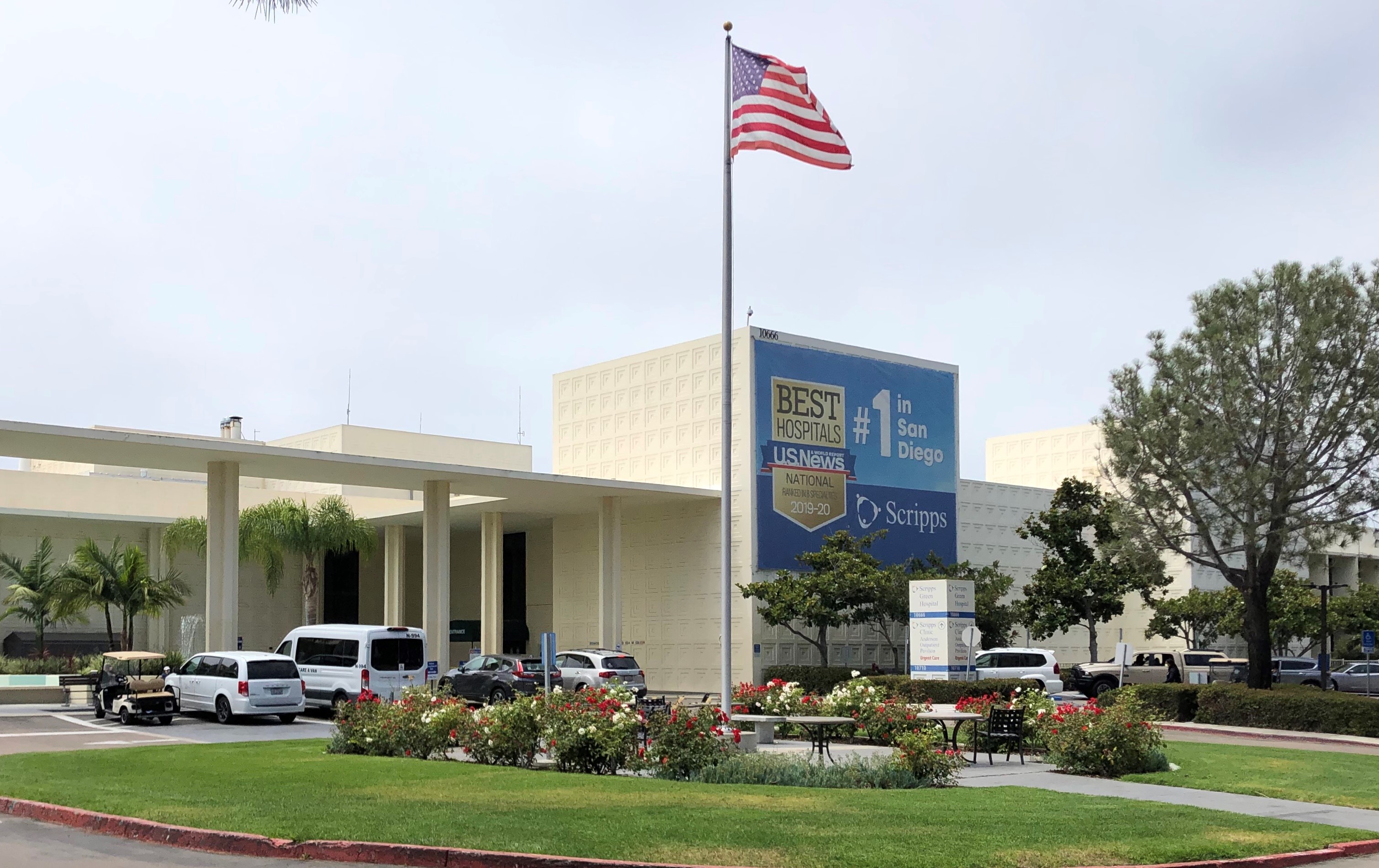Daily Business Report-Sept. 2, 2020
Scripps Green Hospital in La Jolla
Scripps Health launches region’s first
centralized organ recovery center
Goal is to save lives by increasing number of donated organs for transplant
In a move designed to increase the number of viable organs available for patients who need life-saving transplants, Scripps Health has launched a centralized system for retrieving organs from deceased donors.
Scripps Green Hospital in La Jolla will serve as the new single location for managing the complex process of collecting organs from deceased donors for transplant. Deceased donors will be transferred to Scripps Green, where a dedicated organ recovery program has been established to offer the specialized medical management that is needed for optimal organ recovery.
The new system is the first of its kind in San Diego County. It is being introduced in a phased approach, starting in September with all deceased donors from Scripps Memorial Hospital La Jolla and Scripps Memorial Hospital Encinitas being transported to the organ recovery center at Scripps Green. Later this year, Scripps Mercy Hospital’s San Diego and Chula Vista campuses will begin taking part in the new program.
“The opening of this new center will provide the optimal setting to medically manage the deceased organ collection process, so the maximum number of organs can be collected in the most viable state, and as rapidly as possible for transplantation,” said Christopher Marsh, M.D., division chief of the Scripps Center for Organ Transplantation at Scripps Green Hospital. “We believe that having a specialized, dedicated center for organ collection will improve efficiencies in a way that can help save lives.”
The centralized organ recovery program at Scripps Green includes a team of caregivers and resources that are specifically devoted to deceased organ retrieval. This includes critical care doctors, intensive care unit staff and operating room staff, along with designated operating room time for organ collection. A team of Scripps navigators will facilitate the process.
________________________________________
Oceanside opens $100,000 grant program
for small businesses hurt by pandemic
Times of San Diego
The Oceanside City Council has approved a plan for $3.13 million in CARES Act funding, including $100,000 for grants to help small businesses.
Eligible businesses include independently owned retailers and those that provide
consumer and business services and have been forced to close or limit their activity during the pandemic.
Grants ranging from $1,000 to $5000 will be awarded based on business type and changes forced upon the business. Officials also will consider the year-over-year financial impact on the applicants.
Applications will be accepted through Dec. 31 or until the funds are exhausted.
The City of Oceanside partnered with MainStreet Oceanside and the Oceanside Chamber of Commerce on the program and disbursal of funds to eligible Oceanside businesses.
MainStreet will manage the program for eligible downtown businesses, while the Chamber of Commerce will administer grants for businesses citywide.
“To help mitigate impacts to Oceanside small businesses financially affected by regulations, the city is happy to announce this program as we continue to navigate these challenging times,” Mayor Peter Weiss said.
________________________________________

Area colleges nationally selected
for FAA UAS training program
The Federal Aviation Administration (FAA) announced 26 schools nationally have been chosen, so far, to participate in the Unmanned Aircraft Systems Collegiate Training Initiative. Three of these colleges are MiraCosta College, Palomar College, and Southwestern College.
The FAA’s program allows educational institutions to collaborate with the FAA to help students pursue their aviation career goals. The new program prepares students for careers in unmanned aircraft systems, commonly referred to as drones.
The UAS-CTI program requires institutions that prepare students for careers in UAS to offer a bachelor’s or associates degree in UAS or a degree with a minor, concentration, or certificate in UAS. Schools must provide curriculum covering various aspects of UAS training, including hands-on flight practice, maintenance, uses, applications, privacy concerns, safety, and federal policies concerning UAS.
________________________________________
National City company wins $12.2 million contract
to provide system to combat adversarial drones
The U.S. Government and Department of Defense has awarded National City-based Citadel Defense a $12.2 million contract to defeat enemy drones on the battlefield and at covered locations in the United States through its Titan system.
The decision to purchase Titan systems was made after extensive U.S. government evaluation that assessed more than a dozen other counter drone solutions.
Selection of Titan addresses immediate challenges caused by rapidly evolving drones domestically and overseas. Titan operates as a standalone system that is equally effective in fixed, mobile and dismounted operations which simplifies lifecycle and sustainment challenges burdening troops and budgets today.
“Deployed warfighters designed the system. Weighing 20 pounds and capable of autonomous operation, Titan has been detecting, identifying and defeating adversarial drones in extremely isolated fixed locations, complex urban environments, mobile missions on-the-move, and dismounted operations where man-portability is a premium,” said Matthew England, vice president of Citadel Defense.
Citadel ramped up production of Titan systems in response to increased demand. All systems will be delivered before December.
________________________________________

How renters, landlords and banks
fared in the eviction compromise
CalMatters
Hundreds of thousands of California renters were saved from eviction — at least for the next few months — under a bill lawmakers passed and Gov. Gavin Newsom signed late Monday night, a day before the state’s eviction ban is set to expire.
Though the bill passed both the Senate and Assembly with a supermajority of votes — and bipartisan support — it leaves many unsatisfied, notably tenants rights’ groups.
That’s because renters who aren’t financially impacted by the coronavirus pandemic could be evicted starting tomorrow. And there isn’t rent forgiveness for tenants who are financially impacted by the pandemic, who must pay back all missed rent by March 1, 2021. To avoid being evicted come February, renters must pay 25 percent of what they owe from September through January.
Though the bill was backed by the California Apartment Association, one of the state’s most powerful landlord lobbies, it still leaves unanswered small landlords’ questions of how they’re supposed to make their mortgage payments.
________________________________________
General Atomics and Sener Aeroespacial
team to develop new NATO pod for MQ-9
Since General Atomics Aeronautical Systems Inc. (GA-ASI) and the engineering and technology firm SENER began collaborating in 2008, the international partnership has resulted in significant agreements regarding the MQ-9A Remotely Piloted Aircraft (RPA) for Spain and its adaptation to the requirements of the Spanish Armed Forces, according to General Atomics.
The latest joint development effort is a NATO Pod, designed and built by SENER Aeroespacial, part of the SENER Group. General Atomics will integrate the NATO Pod onto the MQ-9 aircraft line to increase its configuration and payload options.
NATO Pod development is driven by General Atomics’ initiative to provide customers with a customizable pod for carriage of sovereign, cross-domain Intelligence, Surveillance and Reconnaissance (ISR) sensors that can be integrated onto GA-ASI-built MQ-9A and MQ-9B RPA Systems. GA-ASI is working with European suppliers to add sensor capabilities to the new European-built payload pod that meets NATO airworthiness standards.
________________________________________

Hillcrest office building
acquired for $1.6 million
A 2,822-square-foot office building at 3714 Fourth Ave. in Hillcrest has been purchased for $1.6 million by Dr. John Hilinski, a plastic surgeon who owns the JH Medical Spa next door. The sellers were Ryan and Melissa Roulette.
Hilinski plans to use this site to expand his practice with JH Medical Spa to include esthetician services and a high-end salon.
Bud Marsh and Derek Applbaum of Colliers International San Diego Region represented the buyer and sellers in the transaction.
________________________________________

A McDonalds and Union gas station
in Pacific Beach sold for $8 million
A 3,234-square-foot McDonalds and 2,329-square-foot Union 76 service station on two parcels totaling 50,754 square feet of land in Pacific Beach have been sold for $8 million to Mission Day LLC. The seller was JR&C Harris.
“This property was originally claimed by homesteaders in the 1800s and held within the same family for generations,” according to Brandon Keith, senior vice president in Voit Real Estate Services’ San Diego office. “The buyer in this transaction is only the second party to hold title according to official records.”
The property is located at 4711 Mission Bay Drive and 2804 Garnet Ave.
Voit’s Keith, Kipp Gstettenbauer and Ryan King represented both the buyer and seller in the transaction.
________________________________________
New podcast: The life-saving anticoagulant
that started out as a rat poison
Game Changers in Medicine, the new monthly podcast from Dramatic Health, today premieres its third episode, “Warfarin: How a rat poison became one of the world’s most widely prescribed drugs.”
Warfarin, an anticoagulant, first came into commercial use in 1948 as a rat poison. Just four years later it was approved for medical use in the United States and went on to become one of the world’s most prescribed drugs. Produced by Dramatic Health co-founder and CEO Sean T. Moloney, the series is hosted by renowned medical futurist Dr. Rubin Pillay of the University of Alabama at Birmingham.
For details on the podcast, click here
_______________________________________
San Diego’s Sundt ranks No. 67 on America’s
largest employee-owned companies list
Sundt Construction Inc. ranks No. 67 on the National Center for Employee Ownership’s Top 100 largest majority-employee-owned companies list and No. 8 within the construction industry.
“Employee-ownership is core to who we are,” said Nicole Calamaio, Sundt’s chief human resource officer. “Employee-ownership is a model that creates a rewarding work environment and a passionate, innovative company culture.”
In 1972, Sundt established an Employee Stock Ownership Plan (ESOP), and today the company is 100 percent employee-owned. An ESOP company is different from traditional types of corporate ownership in that it is owned in whole or in part by its employees through its ESOP trust, and each employee-owner shares in the profits and success of the company.
At Sundt, all employees are generally eligible for participation after 1,000 hours of credited service during the initial full 12 months of employment.
To earn a spot on the list, companies must be at least 50 percent owned by an ESOP or other qualified plan or by one or more other kinds of plans in which at least 50 percent of full-time employees are eligible to participate.




